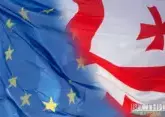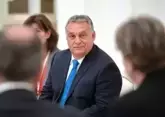To the untrained eye, Georgia’s European future looks secure. Yet, zoom in closer and Georgia is quickly turning into another oligarchic regime in the region, where political competition and free speech are on the wane. EuroActiv published the article headlined Georgia: Failing democratic transition or Eastern Partnership success story? where a member of the Georgian parliament from the opposition United National Movement, the former head of Georgia’s Mission to the European Union, Salome Samadashvili, calls on Brussels to act:
As the European Union prepares for the next Eastern Partnership summit this autumn, Georgia is often showcased as the success story. Association and free trade agreements with the EU, as well as the visa-free regime, are now in place and the EU-Georgia agenda seems busy. The Georgian Dream party, after gaining a constitutional majority in 2016 parliamentary elections, marred with violence and irregularities, is set to change the constitution in order to secure its rule for a long time to come. These changes will make another democratic change of government in Georgia over the next decade very unlikely. How the European Union decides to respond to the ongoing constitutional change might determine the future of Georgia and whether or not Europe can claim its EAP policy to be a success story.
If enacted by a third and final reading in September, the proposed constitutional draft, ignoring the recommendations of the Venice Commission and the promises of the governing party to move to a fully proportional system of parliamentary elections, will keep in place till 2024 the existing mixed system, in which half of the parliament’s 150 members are elected through single-mandate districts.
Financial and administrative advantages in the hands of the incumbent party are usually instrumental in winning the single-mandate districts. The opposition failed to secure a single one of them in 2016. This is how the governing party has managed to put together its constitutional majority despite having low popular support in 2016. And this is how it plans to stay in power in 2020, despite the rapidly dwindling enthusiasm of its voters.

The parliament elected in 2020, together with the regional representatives, also likely to be from the party in power, will elect the president of Georgia in 2023, as direct election of the president will be abolished. Recent polls show that 92% of Georgian voters would like to elect their president directly, as has been the case over the course of last 25 years, since Georgia regained its statehood in 1991. If all goes according to the government’s plan, the parliament, local government and president will all represent the same political party by 2023, leading to a full concentration of power and one-party rule, which virtually will mean it becoming a one-man show, with Bidzina Ivanishvili, the man behind the Georgian Dream party, in the starring role.
With the government-controlled judiciary, the political system will lack any mechanisms for securing checks and balances or separation of powers: the central pillars of any democracy. Georgian civil society, democratic opposition, as well as the president of Georgia have all vocally opposed the proposed constitutional changes. The Venice Commission has warned the government that the constitution, enacted by one party against the consensus of all other political actors, will lack any legitimacy. If the government ignores these warnings, Georgia is set to enter yet another political crisis, which could also set back the EU-Georgia cooperation agenda. A broad national consensus against the proposed draft will lead to further polarisation of Georgian politics, with the government acting against the will of public, as well as all relevant political actors. Now it is up to the European Union to increase its pressure on the Georgian government, reminding them that advancement of democracy is the sine qua non for Georgia’s European future. The overwhelming majority of Georgians support membership of the European Union because they believe in democracy and freedom. While they still have some say in who governs them, Brussels is heard loudly and clearly in Tbilisi. In order for us to continue enjoying democratic freedoms, it is time for Brussels to speak up.
"I was head of Georgia’s Mission to the EU in 2012 when the United National Movement lost the elections. Many Georgians who have devoted their lives to securing Georgia’s future in Europe, including myself, had to welcome the first democratic change of government through elections in Georgia’s history. But we were concerned that the oligarch who came to power through the elections, promising democratic rule, would turn out to be a Trojan horse for Georgia’s European future and democracy. It would be a sad day for Georgia, as well as Europe’s Eastern Partnership Initiative if our fears about long-term oligarchic rule in our country were proved right. This by default would put Georgia’s Euro-Atlantic future on hold. The true success story of Georgia is its full-pledged membership in the European Union and NATO. Going through another change of government by free and fair elections is the necessary condition, signalling a maturity of Georgia’s democracy, to achieve that goal. The proposed constitutional change is delaying any prospect of such change by at least a decade. A decade, which Georgia does not have, thanks to the daily growth of Russia’s political and economic influence," - Samadashvili believes.










